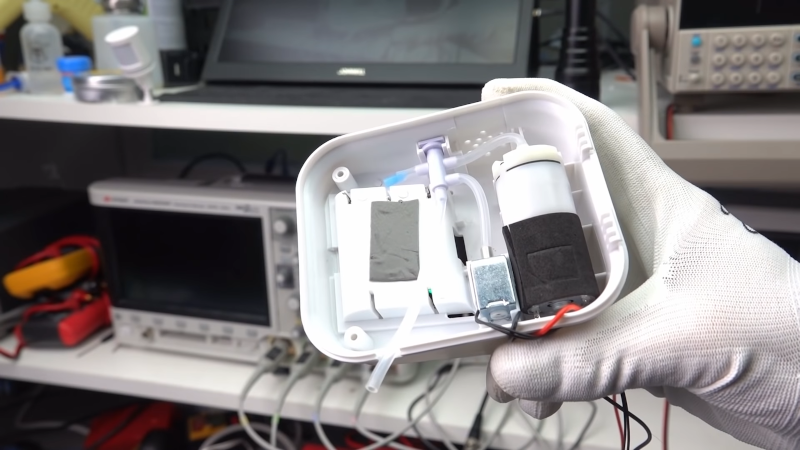We often write a post and then learn something new and cool from the comments. The same thing happened when [Andreas] posted a video about monitoring fluid levels. Commenters told him that the best fluid level sensor was a hacked blood pressure monitor. He didn’t know that, and we didn’t either, until we watched his video, below.
It is well-known that an air-tight tube in a tank that is closed at the top and open inside the tank will develop a pressure that corresponds to the liquid level in the tank. This is a common approach when you want the pressure sensor to be far away from the tank in, say, an enclosed building. So why use a blood pressure monitor? Because a common enhancement to the system is to use a pump to pressurize the measurement tube first so the system can tolerate small leaks. The blood pressure monitor has everything you need: a pump, a valve, and a pressure sensor.
To get accurate results, you need to measure differential pressure. Pressure transducers can measure gauge pressure, differential pressure, or absolute pressure, depending on the kind you select. [Andreas] took apart a cheap blood pressure cuff and there were all the needed parts. Like most cheap consumer gear, though, the CPU was a mystery blob of epoxy.
Some prebuilt sensor modules had some issues because of the 5V supply. In the end, he used a new sensor, a microcontroller, and then used the pump and valve from the blood pressure cuff. It is easier to repurpose the blood pressure machine than build an airtight system from scratch.
Pressure sensors are usually just sophisticated versions of old barometer technology. Like most things, there are many ways to measure fluid levels including ultrasonics, floats, capacitive sensors, and, of course, math.
















But if I scavenge from my blood pressure meter, how will I know when my pressure is low?
Whenever you hit the floor.
Yeah, blood pressure is a thing. Did that once. Heat, dehydration, a few beers. Surprising how quick all lights are out. I was unconscious until slamming the floor. Tackled a random guy on the way down. He was bleeding but luckily like “huh, that was fun to watch.”
I was always told that it is the landing that hurts, not the fall.
So as long as you get notified that you are falling before you land, you should be fine?
Accelerometers and IMU are so cheap nowadays you could have a couple and get almost a second of notice!
*ba-dum-tsh* ;-)
Iirc, falling generally has no problems, physically. The termination de-accel is the issue causing damage
It is the jerk of the de-acceleration which lets the brain bump on the inside of the skull on inpact.
Or the sharp 90° edge of the door frame on the way to the ground, which made a flesh wound and 22 stitches at 11:30p.m. on saturday.
On the other hand, I had a then 81 y/o person in my family slip and sliding down one whole level in a domestic staircase, covered with fluffy thick 70ies carpet. Almost no problem, only the following lack of confidence and a little leak.